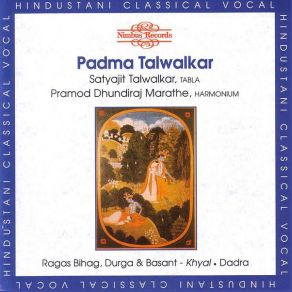Ragas Bihag, Durga & Basant / Dadra
Download links and information about Ragas Bihag, Durga & Basant / Dadra by Padma Talwalkar. This album was released in 1998 and it belongs to World Music genres. It contains 7 tracks with total duration of 01:12:59 minutes.

|
|
|---|---|
| Artist: | Padma Talwalkar |
| Release date: | 1998 |
| Genre: | World Music |
| Tracks: | 7 |
| Duration: | 01:12:59 |
| Buy it NOW at: | |
| Buy on iTunes $9.99 | |
Tracks
[Edit]| No. | Title | Length |
|---|---|---|
| 1. | Raga Bihag: Kaise Sukha Sove (Khyal, Vilambit Ektal) | 20:48 |
| 2. | Raga Bihag: Re Moraa Re (Khyal, Drut Tintal) | 6:47 |
| 3. | Raga Durga: Sahki Mori Ramajhuma (Khyal, Madhyalaya Jhaptal) | 12:49 |
| 4. | Raga Durga: Tana Derena Dere Dere (Tarana, Drut Tintal) | 4:22 |
| 5. | Raga Basant: Phagavaa Brija Dekhana Ko (Khyal, Drut Tintal) | 9:38 |
| 6. | Raga Basant: Derna Derna Tana Dere Na (Tarana, Drut Tintal) | 6:00 |
| 7. | Dadra: Koyaliyaa Mata Kar Pukaara | 12:35 |
Details
[Edit]Repetition can work wonders in music. Whether the artist is Ali Akbar Khan or James Brown, the key to effective repetition is finding the right grooves and staying on them. Padma Talwalkar uses repetition to her advantage on Ragas Bihag, Durga & Basant: Dadra, a recording of traditional Indian spiritual music (also known as "Indian classical music"). Talwalkar comes from the Hindustani school of Indian traditionalism, and her approach is entirely North Indian on four extended ragas: "Raga Bihag," "Raga Druga," "Raga Basant" and "Dadra." Joining Talwalkar are her husband Suresh Talwalkar (who plays Indian tabla drums), tamboura player Gauri Suresh Dahle and harmonium player Pramod Dhundiraj Marathe, all of whom hold the groove down while she sings passionately in various Indian languages. The ragas seem to groove endlessly, which is exactly the point — you grab onto the groove and (much like James Brown in funk or early Donna Summer in disco) work both yourself and the listener into a blissful state by sticking to it. Repetition is also a key part of modern Indian pop, which incorporates American funk and dance music. But unlike Indian pop artists, Talwalkar isn't embracing something that started in the 20th century — she's part of a tradition that goes back millenniums.